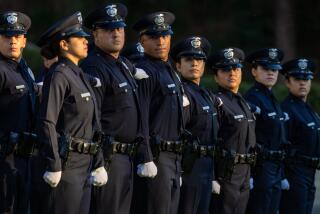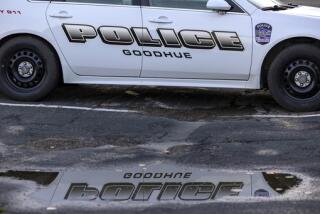Inching toward a milestone in Anbar
- Share via
RAMADI, IRAQ — As Iraqi officials and the U.S. military haggle over when to let Anbar province take control of its own security, a row of broken-down Ford pickups in a Ramadi schoolyard offers a sobering picture of the readiness of the region’s security forces.
The U.S. military gave the vehicles to the police officers stationed in a former school here, but the Iraqi government hasn’t provided parts or a maintenance system to keep them running. The officers work on their own vehicles, picking parts from the junkers.
A shaky connection with the Shiite-led government in Baghdad is just one of the problems confronting American efforts to disengage from the predominantly Sunni Arab province more than a year after the U.S. military joined with local security forces, former insurgents and tribal warriors to take on Al Qaeda in Iraq here.
A formal transfer from U.S. to Iraqi control over security in Anbar had been scheduled for early July, then put on indefinite hold after a suicide bomber targeted a town council meeting in the town of Karmah, killing three Marines and at least 22 Iraqis. The U.S. military initially blamed poor weather for the postponement, but several local leaders said the bombing showed that Iraqi security forces were still not prepared.
The transfer will be a milestone in the war in Iraq, as a declaration of victory in the birthplace of the insurgency and a province that only two years ago was considered lost to Al Qaeda in Iraq. The delay has put a damper on hopes for a triumphant U.S. withdrawal soon.
Yet even as the ceremony hangs in limbo, Marines and Iraqi police officers in Ramadi are transferring the reins of security, little by little.
On a recent day, Capt. Jonathan Hamilton, commander of the weapons company of the 1st Battalion, 9th Marines, dropped by the Forsan station, with its impromptu salvage yard.
For more than a year since the Forsan police station was established as an outpost in the abandoned school, a detachment of Marines has lived and worked there alongside the Iraqi police.
Hamilton said it was time for the station to stand on its own. The young police force had proved its capability to maintain the rule of law in this provincial capital of 400,000.
Gradually, the Marines are trying to demilitarize the city, Hamilton said. One by one, they’re pulling out the units that billeted in 11 police stations, rolling up their razor wire and withdrawing to bases outside the city.
“We’re not leaving, for sure,” Hamilton said. “We’re just reducing our footprint.”
But during his visit to Forsan, the generator conked out. Hamilton had his meeting with police Col. Hassan Nayif Abd, the south precinct commander, in the dark.
“Col. Hassan,” as the U.S. commanders call him, was comfortable with the Marine detachment leaving his station, but he certainly didn’t want to go cold turkey. Could Hamilton send one of his engineers by to fix the generator, he wanted to know.
Power failures are not the only challenges facing Ramadi’s new police force as it lurches toward self-sufficiency. During four days spent with Hamilton’s weapons company, The Times observed numerous issues with the management of police stations, including inefficient procurement systems and meddling by tribal sheiks.
At the same time, both U.S. military and Iraqi police commanders are confident that the training and professionalism of the line policemen has progressed so far that there is no immediate concern about a possible resurgence of Al Qaeda in Iraq.
“The security situation is good and it is progressing every day,” said Lt. Col. Dhahir Mahmoud Allawni, who runs the Warrar police station, where insurgent suspects are detained. “The people will not accept that Al Qaeda returns.”
Almost unanimously, local Iraqi police commanders said that they were ready to assume full responsibility, but that it would be better to delay the transfer until after provincial elections, which had been scheduled for October but are delayed indefinitely amid political wrangling.
What concerns them is not Al Qaeda in Iraq, they say, but the complex claims to power that have yet to be resolved since the expulsion of the extremists.
“We have some political conflict,” Allawni said. “We have some greedy politicians. They put their self-interest in front of the people’s interest. We have a big number of political parties delineated according to their tribes. The terrorists might exploit the conflicts.”
The political ferment in Ramadi arose from the nearly complete collapse of legitimate local institutions while Al Qaeda in Iraq controlled the city and during the subsequent fighting.
Not only did the police force disintegrate, but government ministries vanished and elected leaders abandoned the province, at times holding meetings in Baghdad.
In their absence, the sheiks and other leaders created an ad hoc representative government with a citywide council and sub-councils meeting at the neighborhood level.
Although these groups have no basis in Iraq’s constitution, they continue to exert influence, partly with the support of the Marines, who see them as useful instruments of governance at a chaotic time and as channels for vital information about potential Al Qaeda in Iraq holdouts. The Marines still staff their meetings.
“I’m proud that the neighborhood councils we are working with are still working,” Capt. Hamilton said.
In the meantime, even as the official transfer of authority hangs in limbo, U.S. military and Iraqi police commanders continue taking concrete steps to transfer operational control.
Putting it bluntly, Hamilton said, the Marines are weaning the Iraqi police off U.S. assistance.
“When we live in an IP [Iraqi police] station, we put a generator in there,” Hamilton said. “The station gets power off that generator. Now that we’re not in the police station, they’ve got to ask themselves how to get that generator.”
It is a mission requiring subtle cultural understanding as much as military knowledge, and line officers such as Hamilton seek a balance between the U.S. military model and ancient traditions of tribal influence and social standing.
The routines of Forsan station bear little resemblance to the tight order of an American police station. Its halls are busy with dozens of policemen who mill about with no apparent duties. It’s not uncommon for men to spread their prayer rugs in the hallway.
Hamilton and other U.S. military advisors said the Iraqi recruits have progressed rapidly through the basics of police work, conducting checkpoints, searching people, handling detainees and field communications.
They aren’t nearly as advanced in essential systems such as procurement, accounting, maintenance and weapons management, which require well-defined procedures and efficient relations with the Interior Ministry in Baghdad, both still prone to breakdowns.
The depth of the problem is evident in Forsan’s pickup salvage yard.
In addition to procuring parts, getting fuel to run the vehicles is also a constant headache. Because arrival of supplies from Baghdad is irregular, one commander said, he has taxed his own men to buy fuel in town. Some businessmen in Ramadi have complained that police officers simply commandeer fuel.
“I think the bottom is actually more successful than the top,” said Marine Lt. Chris Yoder, a platoon commander. “They’re doing what they can to support themselves.”
Supplies come from the Interior Ministry through an arcane bureaucratic procurement process that has no standard forms and no comprehensive budgeting.
By contrast, American procurement is almost invisible, Yoder said.
“If my Marines don’t have enough ammo to go on a mission, all I have to do is ask and ammo magically appears,” he said.
Gradually, the procurement issues are being worked out, station commanders said.
Looking ahead, Hamilton sees his greatest challenge as keeping the police free of tribal and political influence.
An incident a few weeks ago, in which a police officer killed a civilian at a checkpoint, illustrated the potential for discipline to unravel.
Finding the shooting unjustified, Forsan station commander Col. Mohammed Ali Abdnadi did what he was supposed to do, Hamilton said. He arrested the officer and began an investigation. But members of the victim’s tribe, the Alwani, tried to impose a tribal solution. A gang of Alwani police officers from the north precinct stormed the south precinct headquarters, weapons blazing, to try to snatch the man.
The shooting continued until the Marines got involved, Hamilton said.
The Alwani sheiks then tried to pressure Abdnadi to surrender the man. The Marines intervened.
“We made a statement, ‘No, this isn’t going to happen,’ ” Hamilton said.
The episode blew over. But could it happen again now that the Marines are leaving Forsan?
Hamilton said he expects his units to be out by the end of his deployment in the fall. But he pointed out they’ll still be nearby, in forts outside the city.
“If something happens,” he said, “we’re in a good position to react.”
--
More to Read
Sign up for Essential California
The most important California stories and recommendations in your inbox every morning.
You may occasionally receive promotional content from the Los Angeles Times.













